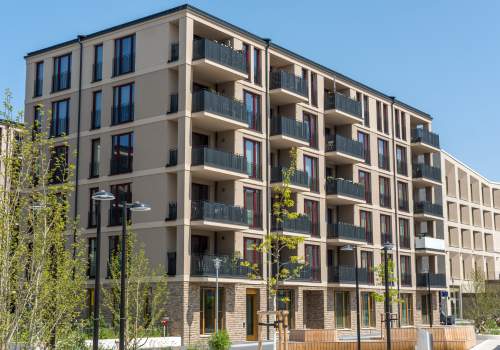13 Brutal Ways Bad Credit Will Sabotage Your Apartment Search
You’ve probably heard that bad credit can complicate your apartment search, but you might not realize just how deeply it can impact your quest for a new home.
From automated rejections that won’t even consider your situation to sky-high security deposits that can drain your savings, poor credit creates obstacles at every turn.
What’s worse, these challenges don’t just affect your ability to sign a lease – they’ll influence where you can live, how much you’ll pay, and even your ability to set up basic utilities.
Before you start your apartment hunt, you’ll want to understand exactly how your credit score could derail your plans.

Automatic Application Rejection
Many landlords and property management companies use automated screening systems that immediately reject rental applications when credit scores fall below their minimum threshold.
You won’t even get a chance to explain your situation or demonstrate your income stability – the computer simply flags your application as denied based on predetermined criteria.
This automated rejection can be particularly frustrating when you’re working to rebuild your credit after financial hardships like medical bills, divorce, or job loss.
You might’ve a solid income and perfect payment history for the past year, but these systems don’t account for your recent progress or unique circumstances.
To avoid wasting application fees, you’ll need to directly ask property managers about their minimum credit requirements before applying, or focus your search on independent landlords who evaluate applications manually.
Higher Security Deposits Required

When landlords do accept tenants with bad credit, they typically require considerably higher security deposits to offset their perceived risk.
While standard security deposits often equal one month’s rent, you might need to pay two or even three times that amount if your credit score is low.
This extra financial burden can seriously impact your move-in costs.
For example, if you’re looking at an apartment with $1,500 monthly rent, instead of a typical $1,500 security deposit, you could face a $4,500 upfront payment.
That’s before factoring in your first month’s rent, application fees, and moving expenses.
You’ll need to carefully evaluate whether you can handle these increased upfront costs and consider saving more money before starting your apartment search.
Additional Rent Payments Upfront
Some landlords require tenants with poor credit to pay several months of rent in advance, beyond the already heightened security deposit.
You might need to fork over three to six months’ worth of rent payments before getting your keys, which can quickly drain your savings or make moving financially impossible.
This upfront payment requirement serves as the landlord’s insurance policy against potential default.
While it’s frustrating to tie up thousands of dollars, you’ll need to weigh this against your housing needs.
If you’re determined to rent a specific apartment, start saving early and consider whether you can negotiate a shorter prepayment period.
You could also look for landlords who’ll accept a qualified co-signer instead of multiple months’ rent upfront, giving you more flexibility with your cash flow.
Limited Housing Options

Beyond the financial hurdles of upfront payments, bad credit can severely restrict your available rental choices.
Many premium apartment complexes and desirable neighborhoods won’t even consider applications from renters with credit scores below their minimum threshold, typically 620-640.
You’ll likely find yourself limited to properties in less desirable areas or older buildings with fewer amenities.
Private landlords might be more flexible, but they often own fewer properties in scattered locations.
This means you’ll spend more time searching and may need to compromise on features you want, like in-unit laundry, updated appliances, or proximity to work.
Some buildings that do accept lower credit scores might’ve strict rules, poor maintenance, or management issues that better-qualified renters can avoid by renting elsewhere.
Cosigner Requirement
Many property managers will require a cosigner if your credit score falls below their minimum threshold.
This person, typically a family member or close friend, must have good credit and sufficient income to qualify.
They’ll be legally responsible for your rent if you can’t pay.
Finding a willing cosigner isn’t easy.
You’re fundamentally asking someone to take a significant financial risk on your behalf.
They’ll need to understand that missed payments will damage their credit score, and they’re on the hook for any unpaid rent or damages.
Some potential cosigners may hesitate due to their own financial obligations or concerns about jeopardizing their credit standing.
If you can’t secure a cosigner, you’ll need to explore alternative options like offering a larger security deposit or seeking private landlords with more flexible requirements.
Premium Rental Rates

Renters with poor credit scores often face higher monthly rates when applying for apartments.
Landlords view bad credit as a financial risk and charge premium rates to offset their perceived exposure.
You’ll likely need to pay anywhere from 15% to 25% more than tenants with good credit for the same unit.
These elevated rates can greatly impact your monthly budget and financial freedom.
For example, if an apartment normally rents for $1,200, you might need to pay $1,500 with poor credit.
Over a year’s lease, that’s an extra $3,600 you could’ve used for other priorities.
While it may seem unfair, landlords use this pricing strategy to protect their investment.
Your best option is to work on improving your credit score before apartment hunting or seek properties from landlords who don’t heavily weigh credit history.
Stricter Income Requirements
Along with higher rental rates, bad credit can trigger tougher income requirements from landlords.
While many property managers typically require your monthly income to be 2.5 to 3 times the rent, they’ll often raise this threshold to 3.5 or 4 times when your credit score is low.
This means you’ll need to earn considerably more to qualify for the same apartment.
For example, if you’re eyeing a $1,200 apartment, you might normally need to prove $3,600 monthly income.
But with bad credit, you could need to show earnings of $4,800 or more.
These stricter requirements exist because landlords view you as a higher risk tenant and want extra assurance you can handle both rent payments and your existing debt obligations.
Complex Verification Processes

Credit-challenged applicants often face a more rigorous screening process when applying for apartments.
You’ll need to provide extensive documentation, including detailed bank statements, pay stubs, tax returns, and employment verification letters.
Landlords may also require references from previous landlords and employers, making the process more time-consuming and invasive.
You might encounter additional steps like submitting written explanations for past credit issues or providing proof of debt resolution.
Property managers will scrutinize your rental history more closely and may contact multiple sources to verify your information.
Each verification step can add days or weeks to your application process, potentially causing you to lose opportunities to other applicants.
Be prepared to maintain clear communication and respond quickly to document requests to keep the process moving forward.
Competitive Disadvantage Against Other Applicants
The competitive rental market puts applicants with bad credit at a significant disadvantage.
When you’re competing against other renters with solid credit scores, landlords will typically choose them over you, even if you’re willing to pay more rent.
It’s a simple risk calculation from their perspective.
You’ll find yourself consistently pushed to the bottom of the applicant pool, especially in desirable neighborhoods or during peak rental seasons.
Many landlords won’t even consider your application once they spot your credit score, regardless of your income or rental history.
They’ve got multiple qualified candidates to choose from, so there’s little incentive for them to take a chance on someone with financial red flags.
This harsh reality means you’ll often lose out on properties you want, even before getting a fair shot.
Extra Rental Insurance Needed

Many landlords require tenants with poor credit scores to purchase additional rental insurance coverage beyond the standard policy.
This extra coverage protects property owners against potential financial losses, but it’ll cost you more money upfront and monthly.
You’ll likely need to increase your liability coverage from the standard $100,000 to $300,000 or more.
Some landlords might also demand additional coverage for property damage.
These requirements can add $15-50 to your monthly insurance costs, depending on your location and coverage levels.
While you can’t avoid these extra insurance demands with bad credit, you can shop around for the best rates.
Consider bundling your rental insurance with other policies like auto insurance, and ask about discounts for security systems or smoke detectors to offset the higher costs.
Property Management Company Restrictions
Most property management companies maintain strict credit score thresholds that you’ll need to meet, typically ranging from 620 to 650.
Unlike individual landlords who might be flexible, these companies follow rigid corporate policies with little room for negotiation.
You’ll face automatic rejection if you fall below their minimum requirements.
Large management companies often use automated screening systems that’ll flag your application immediately if your credit score doesn’t measure up.
They’re also less likely to take into account extenuating circumstances like medical debt or past job loss.
While some companies might offer you a chance to rent with a larger security deposit or additional cosigner, many won’t budge on their credit requirements at all.
Your best bet is to research each company’s specific credit policies before applying to avoid wasting application fees.
Missing Prime Location Opportunities

When searching with bad credit, you’ll often find yourself excluded from apartments in highly desirable neighborhoods where competition is fierce and landlords can be selective.
Prime locations with easy access to public transportation, trendy restaurants, and employment hubs typically attract financially strong applicants, leaving you at a significant disadvantage.
You’re likely to miss out on properties in safe, walkable areas with top-rated schools and vibrant community amenities.
Instead, you may need to compromise by looking in less popular neighborhoods or areas farther from city centers.
While these locations might offer more flexible rental requirements, they often come with longer commute times and fewer amenities.
This limitation can impact your quality of life and potentially increase your transportation costs, making it harder to rebuild your credit over time.
Utilities Connection Challenges
The three major utility companies in your area may require hefty deposits or deny service altogether due to your poor credit history.
You could face upfront payments ranging from $100 to $500 per utility, just to get your electricity, water, and gas connected.
That’s money you’ll need on top of your move-in costs.
Even if you’re approved for utilities, you might need a cosigner or letter of guarantee from someone with good credit.
Some companies won’t budge without it.
You’ll also lose the opportunity to qualify for lower rates and flexible payment options that they reserve for customers with solid credit scores.
If you can’t secure utilities, you’re fundamentally locked out of living independently, as most landlords require proof of utility setup before handing over the keys.
FAQs
How Long Does Negative Credit Information Stay on My Rental History Report?
You’ll typically see negative rental history information remain on your report for up to 7 years, though evictions can stay for longer. It’s best to address these issues early and communicate with potential landlords.
Can I Negotiate Better Terms if I Show Proof of Rental Insurance?
Proactive planning pays off! While rental insurance won’t directly impact your lease terms, showing you’re responsible and prepared can help negotiations. You’ll appear more reliable, but focus on offering larger deposits or prepaid rent instead.
Will Paying Rent on Time Help Improve My Credit Score?
Your rent payments can boost your credit score if you use a rent reporting service or get your landlord to report them. It’s not automatic, but services like RentTrack or Rental Kharma can help.
Are Credit Requirements Different for Private Landlords Versus Property Management Companies?
Private landlords typically take a more personal, flexible approach to credit requirements, while property management companies maintain strict, standardized policies. You’ll often find more wiggle room to negotiate directly with individual owners.
Should I Disclose My Bad Credit Before Applying for an Apartment?
Yes, you’ll save time and money by being upfront about your credit situation. You can explain any extenuating circumstances and discuss solutions like a larger deposit or cosigner before paying application fees.
Final Thoughts
When you’re grappling with bad credit during an apartment search, you’ve got your work cut out for you.
From automatic rejections to sky-high deposits, the challenges can feel overwhelming. But don’t throw in the towel just yet.
By understanding these obstacles and preparing accordingly – whether through finding a cosigner or saving extra funds – you’ll be better equipped to navigate the rental market and secure your next home.